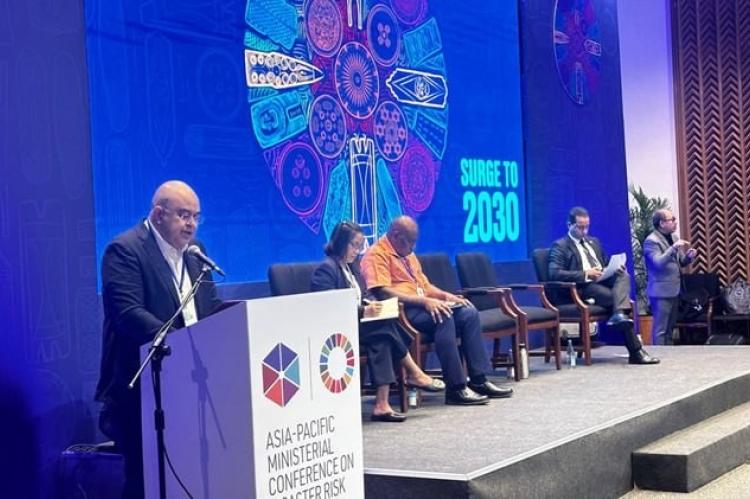Climate body champions loss, damage solutions
Climate Change Commission Deputy Executive Director Romell Antonio O. Cuenca delivers a speech on behalf of Secretary Robert EA Borje during the "Scaling Up Climate Action Against Loss and Damage" event at the Asia-Pacific Ministerial Conference on Disaster Risk Reduction in Manila on October 14.
MANILA – The Climate Change Commission (CCC) on Monday underscored the importance of loss and damage mechanisms in advancing transformative climate actions at the "Scaling Up Climate Action on Loss and Damage," a special event of the Asia-Pacific Ministerial Conference on Disaster Risk Reduction (APMCDRR).
CCC Deputy Executive Director Romell Antonio Cuenca described climate change as "the governance challenge of our generation."
He added that the Asia-Pacific region is home to 4.7 billion people, 60% of the global population, and climate change impacts, including stronger typhoons and rising sea levels, are creating significant economic and non-economic losses across borders.
"Addressing these losses requires going beyond mitigation and adaptation," he said.
He cited the Santiago Network and the Fund for Responding to Loss and Damage (FRLD) as key milestones in global climate governance.
"These mechanisms are essential to support particularly at-risk developing countries, which bear the brunt of climate impacts despite contributing the least to global greenhouse gas emissions," Cuenca added.
He underscored the Philippines' role as host of the FRLD Board as an opportunity for the Asia-Pacific region to lead efforts in addressing the irreversible impacts of climate change.
He also highlighted how the FRLD’s implementation will provide much-needed resources and technical assistance to vulnerable countries in alignment with disaster risk reduction, climate change adaptation, and sustainable development goals.
"The operationalization of the FRLD offers an opportunity to integrate climate action into our development goals," Cuenca said, stressing that this initiative will strengthen institutional capacities and foster collaboration among governments, civil society, and the private sector.
Stressing the need for financial support from global sources to help developing nations cope with increasingly severe climate-related disasters, he affirmed the CCC's commitment to ensure that the FRLD delivers tangible benefits while emphasizing the role of international partnerships and knowledge exchange.
"In operationalizing this Fund, we have the potential to integrate loss and damage into our national climate commitments, such as the Philippines’ Nationally Determined Contribution (NDC) under the Paris Agreement," he said, calling for a united effort to address the climate crisis for the benefit of future generations.
The special event, which brought together global and local leaders, policymakers, and climate advocates, provided an update on the rollout of loss and damage mechanisms and discussed challenges and opportunities in doing so in the region.
The APMCDRR is Asia-Pacific's primary platform for monitoring and advancing regional cooperation on the Sendai Framework for Disaster Risk Reduction 2015-2030. This year, the Philippines partnered with the United Nations Office for Disaster Risk Reduction (UNDRR) to host the event, which gathered international governments, organizations, the private sector, and stakeholders to accelerate disaster risk reduction efforts.
CCC is the government's lead policy-making body, tasked with coordinating, monitoring, and evaluating government programs and ensuring the mainstreaming of climate change in national, local, and sectoral development plans, with the goal of a climate-resilient and climate-smart Philippines.

